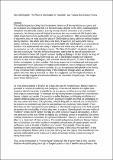New Old English : The place of Old English in twentieth- and twenty-first-century poetry
Abstract
This article begins by noting that the narrative coherence of literary history as a genre, and the inclusions and exclusions that it is forced to make, depend on the often unacknowledged metaphors that attend its practice. Literary history which is conceived as an unbroken continuity (‘the living stream of English’) has found the incorporation of Old English (also called Anglo-Saxon) to be problematic and an issue of contention. After surveying the kind of arguments that are made about the place of Old English as being within or without English literary tradition, this article notes that a vast body of twentieth and twenty-first century poetry, oblivious to those turf-wars, has concerned itself with Old English as a compositional resource. It is proposed that this poetry, a disparate and varied body of work, could be recognized as part of a cultural phenomenon: ‘The New Old English’. Academic research in this area is surveyed, from the 1970s to the present, noting that the rate of production and level of interest in New Old English has been rapidly escalating in the last decade. A range of poets and poems that display knowledge and use of Old English largely overlooked by criticism to date is then catalogued, with minimal critical discussion, in order to facilitate further investigation by other scholars. This essay argues that the widespread and large-scale reincorporation of an early phase of English poetic tradition, not in contiguous contact with contemporary writing for so many centuries, is such an unprecedented episode in the history of any vernacular that it challenges many of the metaphors through which we attempt to pattern texts into literary historical narrative. It is suggested that the weight of evidence in this area strongly suggests that in recent decades we have been living through 'The Anglo-Saxon Poetic Renaissance'.
Citation
Jones , C 2010 , ' New Old English : The place of Old English in twentieth- and twenty-first-century poetry ' , Literature Compass , vol. 7 , no. 11 , pp. 1009-1019 . https://doi.org/10.1111/j.1741-4113.2010.00760.x
Publication
Literature Compass
Status
Peer reviewed
ISSN
1741-4113Type
Journal article
Collections
Items in the St Andrews Research Repository are protected by copyright, with all rights reserved, unless otherwise indicated.

